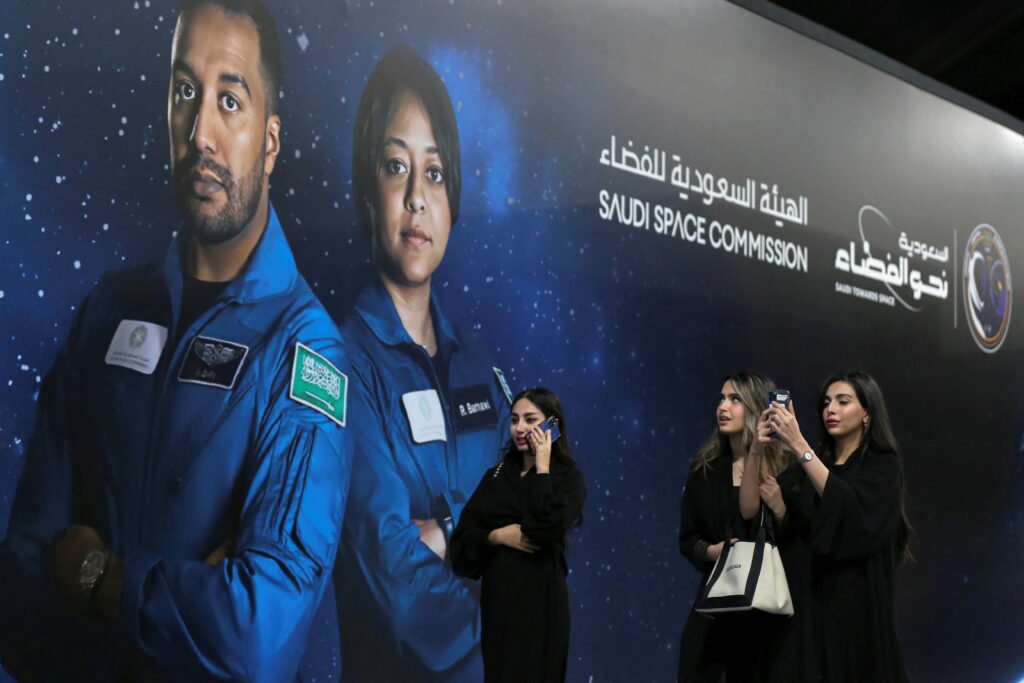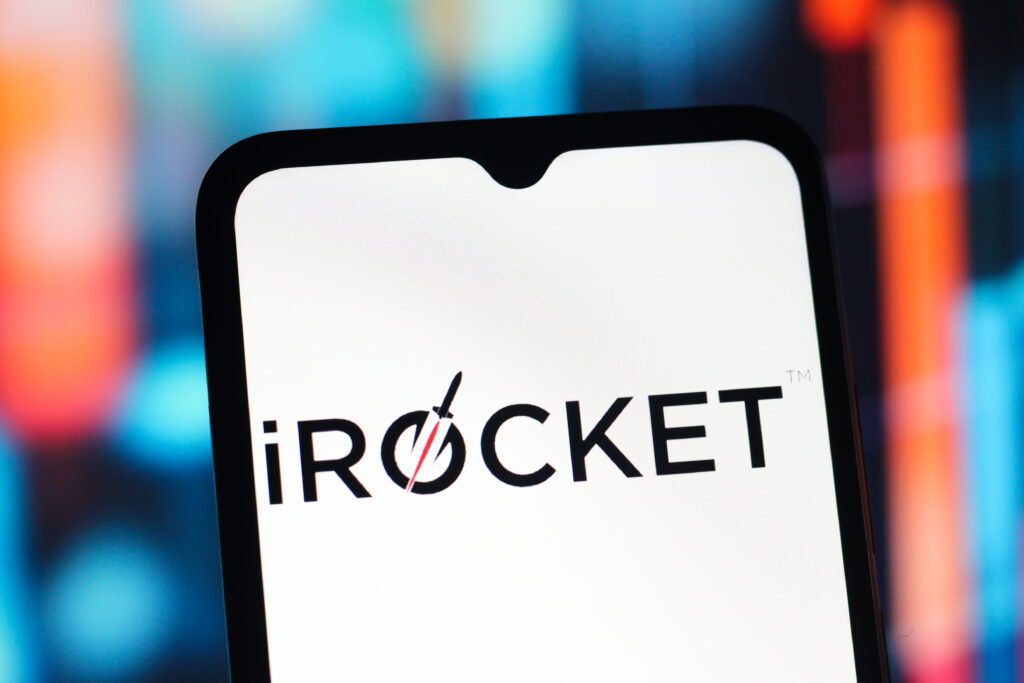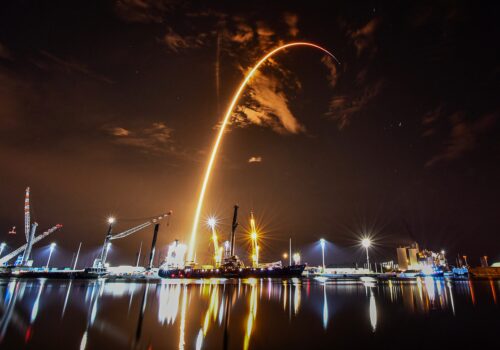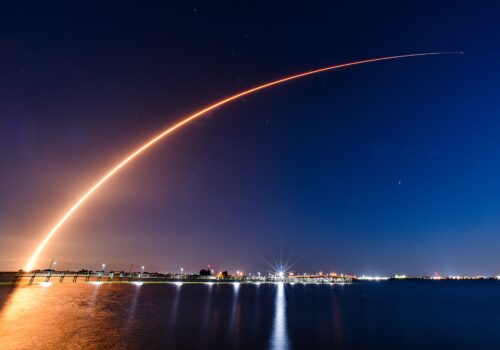Saudi Arabia’s space sector is entering a new chapter with the announcement of a significant partnership between the Saudi-based space logistics and satellite security platform SpaceBelt KSA and the US launch company iRocket.
In August 2025, SpaceBelt KSA signed a $640 million, five-year contract with iRocket to support up to thirty orbital launches, aimed at deploying a low-Earth orbit (LEO) satellite network to provide secure internet and data transmission across the Kingdom and the Gulf Cooperation Council (GCC) region. The agreement is more than just a commercial launch deal. It underscores Saudi Arabia’s resolve to build sovereign space infrastructure in line with its Vision 2030 goals of strategic autonomy, technological competency, and economic diversification.
As noted on SpaceBelt KSA’s website, “this isn’t science fiction; it’s strategic necessity for a resilient future economy.”
The SpaceBelt KSA–iRocket project embodies this vision, aiming to provide Saudi Arabia with an independent, encrypted satellite communications network—a capability that could transform its defense posture, economic security, and technological self-reliance.
What SpaceBelt KSA-iRocket deal brings to the table
Saudi Arabia has already hit several milestones in international space cooperation, including human spaceflight, satellite development, and space policy. However, this deal stands out as a commercially driven, near-term initiative to build sovereign, secure satellite infrastructure with tangible capabilities.

At its core, the SpaceBelt KSA–iRocket partnership aims to establish a secure LEO satellite communications constellation—a space-based network for encrypted internet access, data transfer, and cloud services across Saudi Arabia and its neighbors. Unlike large consumer broadband constellations (for example, SpaceX’s Starlink, which has thousands of satellites), the planned SpaceBelt KSA network will be modest in scale (on the order of several dozen satellites), optimized for confidentiality and resilience rather than mass-market broadband.
Key capabilities the partnership is intended to bring (in addition to SpaceBelt KSA’s existing offerings) include:
- Encrypted communications and data storage: The SpaceBelt network is “being developed” as a sovereign, digitally autonomous infrastructure intended to ensure that data transmitted through it remains under Saudi control and is protected by end-to-end encryption. This is particularly important for government and defense users who need secure communications that cannot be intercepted. According to company statements, SpaceBelt KSA is working with partners such as SpaceChain to integrate blockchain technology for added data integrity, using small satellites (CubeSats) as secure relays to validate and encrypt transactions in orbit. If realized, this would create a tamper-resistant “space cloud” for applications ranging from military communications to financial transactions.
- Dual-use network for defense and enterprise: The planned constellation is designed as a dual-use network, serving both defense and commercial customers. On the one hand, it could support national security needs such as secure military communications, intelligence data links, and emergency backup systems. On the other hand, it is positioned to provide businesses—such as banks, energy firms, and tech companies—with an ultra-secure channel for critical data and applications, including financial transfers or connectivity for remote oil facilities. This flexibility broadens the customer base and underscores the project’s commercial viability alongside its strategic value.
- Launch and technology integration via iRocket: Under the agreement, iRocket will provide launch vehicle integration, mission planning, and propulsion support for up to thirty SpaceBelt KSA launches over five years. iRocket’s forthcoming “Shockwave” reusable rockets are designed to re-launch within 24 hours, powered by methane-fueled engines and reusable stages. While these capabilities remain in development, the deal aims to give SpaceBelt KSA a dedicated, responsive launch pipeline for its constellation. The agreement also references joint testing and possible future launch operations in the GCC, which—if pursued—could lay the groundwork for regional launch infrastructure or even a local spaceport.
- Foundation for tech transfer and local industry: The collaboration also aspires to build a foundation for technology transfer and local industrial growth. Both companies have announced plans to explore regional manufacturing of space hardware and to expand related capabilities in Saudi Arabia. This could involve training Saudi engineers in rocket technologies, assembling satellite components domestically, and developing ground facilities, initiatives that would contribute to the Kingdom’s emerging space industry and align with Vision 2030 goals.
Closing the gap
Prior to this agreement, Saudi space capabilities were still consequential but constrained in certain respects. The Kingdom has launched geostationary communication satellites supporting television, broadband, telephone, and secure communications services—often in collaboration with firms such as Lockheed Martin, Arianespace, and TAQNIA—alongside Earth observation satellites. It also participated in international scientific missions and invested in space science, data infrastructure, and workforce development. However, Saudi Arabia entered this deal with some notable gaps in its space capabilities. Riyadh lacked an indigenous low-Earth orbit communications satellite constellation dedicated to sovereign, secure communications. The Kingdom also did not possess a domestic launch capability that would enable it to reliably schedule missions on demand, remaining dependent on foreign launch providers. In addition, its workforce and institutional capacity for managing large, routine satellite constellations and rapid launch logistics were still in relatively early stages of development.
SIGN UP FOR THIS WEEK IN THE MIDEAST NEWSLETTER
Meanwhile, regional peers are pushing ahead. The United Arab Emirates, for example, achieved Mars orbit in the 2021 Hope Mission, built Earth observation capabilities, and is investing in ambitious projects. Oman, Qatar, and Bahrain are also involved in satellite/space tech initiatives.

The SpaceBelt KSA–iRocket deal is intended to close these gaps in Saudi Arabia’s space capabilities. It provides the Kingdom with a pathway to a sovereign low-Earth orbit satellite network, focused on encrypted and secure communications, which differentiates it from many other regional space projects. If realized, this constellation would complement existing capabilities, such as geostationary communications satellites and foreign-provided internet services, by adding a layer of locally controlled, high-security infrastructure.
Another expected gain is improved launch access. Until now, Saudi satellites, whether CubeSats or large telecom platforms, have depended on foreign rockets, often booked years in advance. With iRocket’s planned reusable launchers, Saudi planners could eventually schedule launches on shorter notice and at higher frequency, a capability typically associated with established space powers.
Notably, the collaboration is structured to bolster operational know-how. Saudi engineers and institutions are expected to work with iRocket’s team on mission planning and integration, offering hands-on transfer of expertise over multiple years. This kind of human capital development addresses the current shortage of domestically experienced space operators and builds on Saudi Arabia’s existing efforts, such as student CubeSat projects and participation in international astronaut missions.
Looking ahead
The SpaceBelt KSA–iRocket partnership, if successful, could attract additional international collaboration. For instance, European or Asian firms may be more inclined to explore projects with Saudi partners, given the Kingdom’s demonstrated willingness to invest heavily in strategic technology. The model may also inspire similar approaches in other sectors, such as artificial intelligence or renewable energy, where the combination of local startups and Vision 2030 backing has the potential to drive breakthroughs.
From a geopolitical standpoint, developing a Saudi-owned secure satellite network would enhance the country’s strategic autonomy. Over the longer term, Saudi Arabia may seek to expand its role in global space initiatives, potentially contributing satellite services for disaster response, participating in federated constellations, or even advancing toward science or exploration missions beyond Earth orbit. These possibilities build on the technical confidence and institutional experience expected to emerge from the deal, as well as the Kingdom’s existing commitments under the Artemis Accords.
Ultimately, the SpaceBelt KSA case offers insights for other foreign aerospace and tech firms considering partnerships in the Gulf. The iRocket–SpaceBelt KSA agreement shows that regional governments are open to bold, non-traditional proposals, and that even smaller firms can secure major contracts if they align with Gulf priorities. For companies eyeing the region, pairing innovative technology with capacity-building and strategic value remains the clearest formula for success in the Gulf’s emerging space market.
Manal Fatima is an assistant director at the Atlantic Council’s Scowcroft Middle East Security Initiative. She coordinates and facilitates the program’s activities while providing administrative support, particularly in overseeing the Iran Strategy Project, the Counterterrorism Project, and the broader initiative.
Further reading
Mon, Aug 4, 2025
What could NATO’s commercial space strategy mean for the Gulf?
MENASource By Manal Fatima
The United States is well positioned to help extend NATO’s emerging commercial space ecosystem to the Gulf.
Fri, Apr 25, 2025
Geopolitics in orbit: What Gulf moonshots mean for Washington
MENASource By
On a multipolar world stage with Russia and China power competition, it’s clear that space collaboration has all-too-earthly impacts.
Wed, Jul 16, 2025
What’s in NATO’s first-ever commercial space strategy?
New Atlanticist By Corey Jacobson
Released at The Hague summit, the Alliance’s new strategy is an important acknowledgement that the private sector is driving innovation in space.
Image: In this photo illustration, the iRocket (Innovative Rocket Technologies) logo is seen displayed on a smartphone screen.



